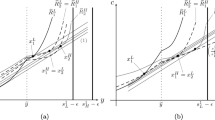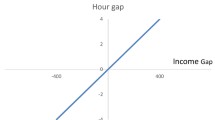Abstract
We adopt a philosophical perspective of equality of opportunity and address the issue of whether outcome inequalities are legitimate when they come from differences in talent. We propose a cumulative definition of talent. In a dynamic setting, talent is a by-product of past-effort, current effort and innate talent, which becomes a residual as time goes by. It implies that talent can change from the status of a circumstance when people are young to an almost responsibility variable when people are getting older. We plug this definition of talent into the Mirrlees model of optimal non-linear income tax and we show that the conflict between the principle of compensation and the principle of natural reward boils down to the optimal income tax with Rawlsian weights in the second-best setting.
Similar content being viewed by others
References
Arneson, R.: Equality and equal opportunity 1786 for welfare. Phil.Stud. 56, 77–93 (1989)
Arrow, K.: The economic implications of learning by doing The Review of Economic Studies 29, 155–173 (1962)
Akerlof, G.: The Economics of ‘tagging’ as applied to the optimal income tax, welfare programs, and manpower planning. Am. Econ. Rev. 68(1), 8–19 (1978)
Atkinson, A.B.: On the measurement of inequality. J. Econ. Theory, 2(3), 244–263 (1970)
Atkinson, A.B.: Public Economics in Action. The basic income/Flat tax proposal. The Lindhal Lectures. OUP (1995)
Atkinson, A.B.: Public economics in an age of austerity, The Graz Schumpeter lectures. Routledge (2014)
Atkinson, A.B.: Inequality: What can be done? Harvard University Press, Cambridge (2015)
Atkinson, A.B., Stiglitz, J.: Lectures on public economics. McGraw Hill, New York (1980)
Ben Porath, Y.: The Production of human capital and the life cycle of earnings. J. Pol Econ. 75, 352–365 (1967)
Bierbrauer, F., Boyer, P.: The Pareto-Frontier in a Simple Mirrleesian Model of Income Taxation, Annals of Economics and Statistics 113/114, 185-206 (2014).
Boadway, R., Marchand, M.P.P., del Mar Racionero, M.: Optimal Redistribution with Heterogeneous Preferences for Leisure. J. Pub. Econ. Theory. 4, 475–479 (2002)
Boadway, R., Brett, C., Jacquet, L.: Optimal nonlinear income taxes with compensation. THEMA WP 2015–15 (2015)
Bossert, W.: Redistribution mechanisms based on individual characteristics. Math. Soc. Sciences. 29, 1–17 (1995)
Bourguignon, F., Spadaro, A.: Tax–benefit revealed social preferences. J. Econ. Inequality. 10, 75–108 (2012)
Brett, C., Weymark, J.: Financing education using optimal redistributive taxation. J. Pub Econ. 87, 2549–2569 (2003)
Cohen, G.A.: On the currency of egalitarian justice. Ethics. 99, 906–944 (1989)
Dworkin, R.: What is equality? Part 1: Equality of welfare. Phil. Pub.Affairs. 10, 185–246 (1981a)
Dworkin, R.: What is equality? Part 2: Equality of resources. Phil. Pub.Affairs. 10, 183–345 (1981b)
Fleurbaey, M.: Three solutions to the compensation problem. J. Econ.Theory. 65, 505–521 (1995)
Fleurbaey, M.: Fairness, responsibility, and welfare. OUP (2008)
Fleurbaey, M., Maniquet, F.: Fair income tax. Rev Econ Stud. 73, 55–83 (2006)
Fleurbaey, M., Maniquet, F.: A Theory of Fairness and Social Welfare. CUP (2011)
Fleurbaey, M., Maniquet, F.: Optimal income taxation theory and principles of fairness. J. Econ Lit. 56(3), 1029–1079 (2018)
Guesnerie, R.: A Contribution to the Pure Theory of Taxation. CUP (1995)
Hammond, P.: Straightforward individual incentive compatibility in large economies. Rev Econ Studies. 46, 263–282 (1979)
Jacquet, L., Lehmann, E.: Optimal nonlinear income taxation with multidimensional types: the case with heterogeneous behavioral responses. THEMA 2014–01 (2014)
Jacquet, L., Van de gaer, D.: A Comparison of optimal tax policies when compensation or responsibility matter. J. Pub. Econ. 95(11–12), 1248–1262 (2011)
Lockwood, B., Weinzierl, M.: De Gustibus non est taxandum: heterogeneity in preferences and optimal redistribution. J. Pub. Econ. 124, 74–80 (2015)
Lu, I., Chanel, O., Luchini, S., Trannoy, A.: Responsibility cut in education and income acquisition: An empirical investigation. Mimeo AMSE. (2013)
Mankiw, G., Weinzierl, M.: The Optimal taxation of height: A case study of utilitarian income redistribution. Am Econ. J. Econ Policy. 2(1), 155–176 (2010)
Menger, P.M.: The Economics of Creativity. Art and Achievement under uncertainty. Harvard University Press, Cambridge (2014)
Mirrlees, J.: An exploration in the theory of the optimum income tax. Rev. Econ. Stud. 38, 175–208 (1971)
Mirrlees, J.: Optimal Tax Theory: A Synthesis. J. Pub. Econ. 6, 327–358 (1976)
Mirrlees, J.: In: Arrow, K.J., Intriligator, M.D. (eds.) The Theory of optimal taxation Handbook of Mathematical Economics, vol. 3. North-Holland, Amsterdam (1986)
Ooghe, E., Schokkaert, E., Van de gaer, D.: Equality of Opportunity versus Equality of Opportunity Sets. Soc. Choice Welf. 28(2), 209–230 (2007)
Roemer, J.: Equality of opportunity. Harvard University Press (1998)
Saez, E.: Using elasticities to derive optimal income tax rates. Rev Econ Stud. 68, 205–229 (2001)
Simula, L.: Optimal nonlinear income tax and non-linear pricing: optimality, conditions and comparative static properties. Soc. Choice Welf. 35, 199–220 (2010)
Stiglitz, J.: Self-Selection and Pareto Efficient Taxation. J. Pub. Econ. 17, 213–240 (1982)
Werning, I.: Pareto Efficient Income Taxation Mimeo MIT. (2007)
Weymark, J.: Comparative Static Properties of Optimal Nonlinear Income Taxes. Econometrica. 55, 1165–1185 (2007)
Young, M.: The Rise of the Meritocracy. Transaction Publishers, London (1958)
Acknowledgements
I thank Marc Fleurbaey and Etienne Lehmann for some exchanges on the matter of this paper. I am very grateful to the editor, Dirk Van de gaer and two referees for comments on earlier versions of this paper which has led to considerable improvements. This paper benefits from the support of the Northface project IMCHILD. The usual caveat applies.
Author information
Authors and Affiliations
Corresponding author
Additional information
Publisher’s note
Springer Nature remains neutral with regard to jurisdictional claims in published maps and institutional affiliations.
Electronic supplementary material
ESM 1
(DOCX 57 kb)
Rights and permissions
About this article
Cite this article
Trannoy, A. Talent, equality of opportunity and optimal non-linear income tax. J Econ Inequal 17, 5–28 (2019). https://doi.org/10.1007/s10888-019-09409-7
Published:
Issue Date:
DOI: https://doi.org/10.1007/s10888-019-09409-7




